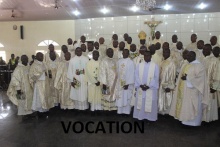If we are to borrow from the inspiration words of the late Archbishop Fulton Sheen, the period of Lent can be considered the period when we are forced to think about what he calls, the two philosophies of life. According to him, we can choose to start our lives with the Feast and like all feasts, end up with a serious hangover. The second choice is that we can choose the Fast and after that follows the feast. He further noted that: Deferred joys purchased by sacrifices are always the sweetest and most enduring.
As it has been over the years, Nigerians continue to wear a face of despondency in response to the persistence of violence, hunger, poverty and squalor. It is tempting to say that for the vast majority of our people, life has become permanent Lent. Faced with an unpleasant task or challenge, we often say we are carrying our crosses.
The temptation to equate our earthly sufferings with those of Jesus often misrepresents the issues. Whereas for us humans, we would do everything possible to escape any form of suffering, what separates Jesus and sets Him as our model is the fact that He willingly embraced His own sufferings and held them up as a model in self giving.
We naturally often see suffering in negative terms because in our human imagination, suffering is of the devil, the father of evil. This is why we pray against suffering. This is why we seek cures and healing from it. The thought of suffering brings fear in all of us. We believe that suffering is evidence of God’s punishment on us because of our sins. This was the story of Job. Alternatively, we see it as a sign that; the Lord has abandoned and forgotten me (Is. 49:14).
Then, Christ entered human history and offered us a totally different message and interpretation of evil and the devil. He first taught us the difference between the feast, the hangover and the fast. His own suffering was predestined thousands of years before He came into the world. The prophet Isaiah referred to Him as the suffering servant. We are told that by it is by; his stripes that we have been healed (Is. 55:5)
The Church has set aside this period for Christians to understand that for all believers in Jesus, suffering is not a punishment but an act that has the seeds of redemption. The destination of the journey of Lent is Easter. So, what are the lessons for us?
First, if God created the world by merely uttering His word and has to save it by the life of His son, then we must appreciate the consequences of sin in our lives. Lent is the most appropriate time for us to come face to face with the reality of the disfiguring consequences of sin in our own lives.
Secondly, contrary to the feeling that suffering means that God has forsaken us, Lent is a time for total surrender to the will of God. It is a period to embrace the Lord and know that as long as we make Him our shepherd, there is nothing we shall want (Ps 23). We can therefore say, In God alone is my soul at rest. My help comes from Him (Ps. 61:1).
Thirdly, faith in the suffering and resurrection of Jesus is the greatest insurance that we have that by embracing and seeing suffering not as a punishment but as the will of God. Our constant prayer as the Lord Himself taught us, must always be, thy will be done.
Fourthly, Lent is coming at a time of great feelings of sorrow and pain as we see in the daily loss of valuable human lives across the country. Human life has become cheap, a victim of what Pope Francis has called, the throw away culture.
However, as Christians, we have been prepared for times like these. We are men and women who live and walk by hope and faith, and, our faith does not disappoint us (Rom.5: 5). We know God is for us and no one can be against us (Rom. 8:31).
As we turn to the Lord in penance, may His forgiveness heal our land and bring about a new resurrection of love. The Book of Ecclesiasticus says; To those who repent, God permits return and encourages those who were losing hope (Eccl. 17:20). Let us fast now in earnest so that the Lord of the feast will, in the end admit us to the feast of eternal life.
Most Rev. Dr. Matthew Hassan KUKAH
Bishop, Diocese of Sokoto.

